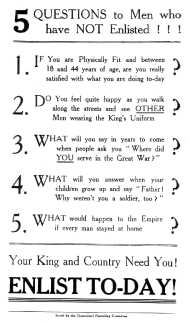The outbreak of war in August 1914 seemed to unleash a huge wave of enthusiastic support for Britain, and support for Australia’s part in the war.
All major political parties, churches, community leaders and newspapers seemed to support Australia’s entry. It was seen as a moral and necessary commitment.

An enlistment poster issued by the Queensland Recruiting Committee.
The questions read:
- If you are physically fit and between 18 and 44 years of age are you really satisfied with what you are doing today?
- Do you feel quite happy as you walk along the streets and see OTHER men wearing the King's Uniform?
- What will you say in years to come when people ask you "What did you do in the Great War?"
- What will you answer when your children grow up and say " Father! Why weren't you a soldier too?"
- What would happen to the Empire if every man stayed at home?
There was a rush to the recruiting offices, and only the very fittest and healthiest men were accepted at this stage.
The whole country seemed to be both enthusiastic for the war, and united in support of it.
There is, however, some evidence that this is an incomplete and even distorted impression. There are hints and suggestions of the fracture lines in society that would later lead to great bitterness and divisions in Australian society.
For example, while many tried to enlist, far more did not. Even during the first enlistment rush, there are stories of white feathers being sent, and women rejecting and abusing men who did not enlist.
There were also some who actively opposed Australia’s entry into the war, though their voice seems to have had few ways of being heard at the time.
To investigate this aspect of the Home Front experience by using evidence from the time, see Home Fronts at War, Ryebuck Media for ANZAC Day Commemoration Committee of Queensland.
(More about the book HOME FRONTS AT WAR)





